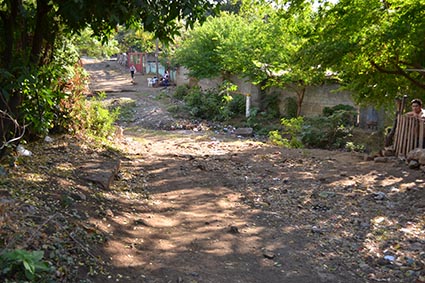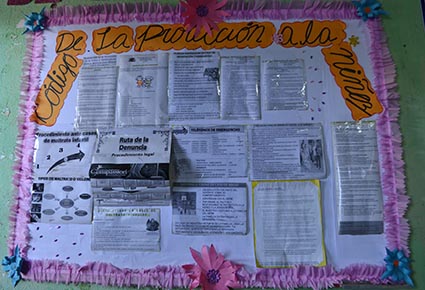The Fourth Nazarene Church in Nicaragua wants to do something for their neighborhood. In their community, alcoholism, drugs, gangs and violence are common, and the church needs good soil in which to sow seeds that will bear good fruit.

The first seed to be sown at the Campamento de Dios Child Development Center is the Word of God. Project director Judith shares,
“We are here to help children and the first help they receive is spiritual. We love them from the moment they are registered and we begin to work with them. The goal is that every child comes to know God and live for Him.”
Recently, 17 teenagers made the decision to accept Christ and be baptized. Many of them are actively helping with anything that comes up at the church — including cleaning, painting and serving others.
Judith tells us,
“We consider teenagers to be the most vulnerable, so we try to protect them through activities and programs such as Máximas Misiones — a program that consists of evangelizing or doing service work for someone in need. We also visit the children’s hospital with the teenagers.
“Some teens are really involved in these activities; others are continually encouraged to stay on the right path away from drugs, alcohol and gangs. We don’t want to lose these kids.
“They see the church as a refuge where they can find love, understanding and protection.”

Curriculum coordinator Ericka also tells us,
“The impact we have is good because the teens share what’s going on at home. We encourage them to talk to their parents and tell them how hurt they feel when Mom or Dad speaks harshly to them.
“Some parents have asked for forgiveness from their children, but others say that teachers shouldn’t interfere in their lives. Our teachers keep encouraging children to talk to their parents because change takes time.”
The child development center also has a psychologist who meets with some of the teens and trains parents.
Judith explains,
“This training really helps all of us to be aware of how we treat and care for children emotionally and physically.”
We regularly emphasize education to parents and teens, for the family’s own future benefit.
The program also protects children from physical abuse.

According to Judith, not long ago a curriculum evaluation revealed that a child was being abused. The necessary process was followed and the child’s situation is now better.
“We had a child who was coming with bruises on her face. The teacher reported it to the director, the pastor talked to the mother, and the child is no longer battered. The mother is attending church more often. However, the child needs psychological help.
“Physical and verbal abuse are common among families here. We tell children that no one can hurt them or call them stupid, but children say, ‘My mom hurts me,’ or ‘My mom says I’m stupid.’ That’s where we step in as a development center and church.”
Our work is endless but the staff and church have the enthusiastic disposition to do it. The church is a refuge and the heart of every child development center. Just as Jesus did when He came to give life and salvation, today our staff, in this and every center, are committed to do their best to release children from poverty in Jesus’ name.
The seed that this church sowed is beginning to produce fruit as parents and teens are more excited to engage in our activities in their community.







0 Comments |Add a comment